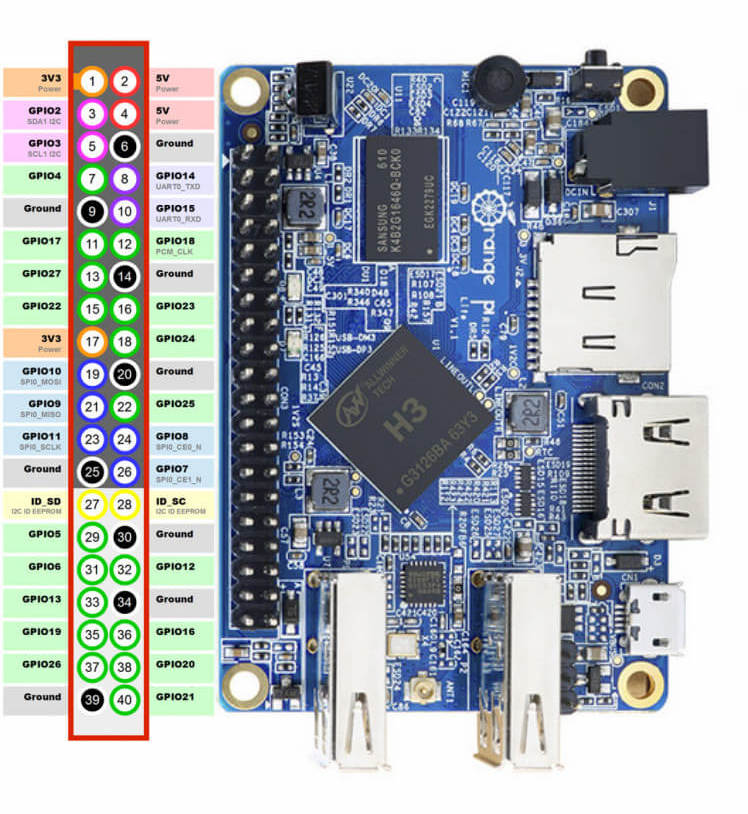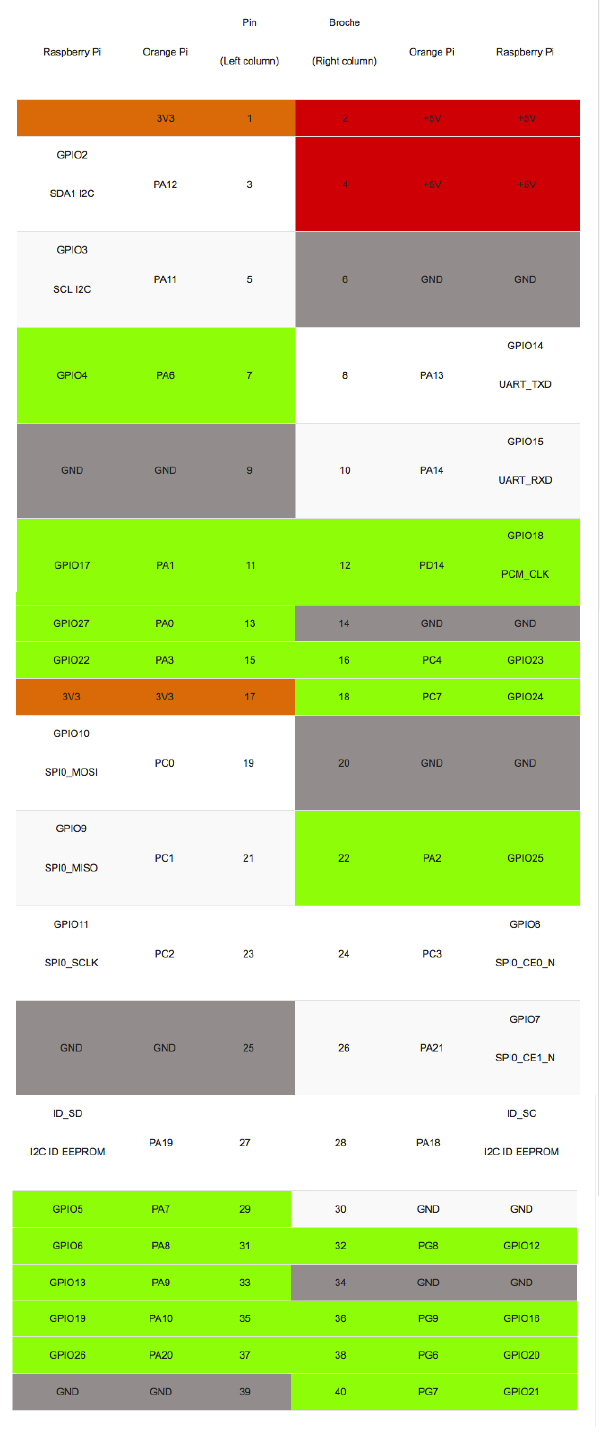OrangePI: Skirtumas tarp puslapio versijų
Jump to navigation
Jump to search
| 1 eilutė: | 1 eilutė: | ||
= OrangePI Lite = | = OrangePI Lite = | ||
| + | |||
| + | == Linux distribucijų niuansai == | ||
Stabili palaikoma [[Armbian]] distribucijos versija [https://armbian.hosthatch.com/archive/orangepilite/archive/Armbian_5.75_Orangepilite_Debian_stretch_next_4.19.20.7z Armbian_5.75_Orangepilite_Debian_stretch_next_4.19.20]. Kitos distribucijos ir/ar versijos su naujausiais 5.x arba 3.x branduoliais veikia blogai ir nepatikimai. Dažnai pasitaikančios problemos kyla su wifi ir microsd kortelių tvarkyklėmis. Bet kokiu atveju patartina naudoti stabilesnį usb wifi tinklo adapterį. Kaip įdiegti išorinį wifi usb adapterį aprašyta [[rtl8192du|čia]]. | Stabili palaikoma [[Armbian]] distribucijos versija [https://armbian.hosthatch.com/archive/orangepilite/archive/Armbian_5.75_Orangepilite_Debian_stretch_next_4.19.20.7z Armbian_5.75_Orangepilite_Debian_stretch_next_4.19.20]. Kitos distribucijos ir/ar versijos su naujausiais 5.x arba 3.x branduoliais veikia blogai ir nepatikimai. Dažnai pasitaikančios problemos kyla su wifi ir microsd kortelių tvarkyklėmis. Bet kokiu atveju patartina naudoti stabilesnį usb wifi tinklo adapterį. Kaip įdiegti išorinį wifi usb adapterį aprašyta [[rtl8192du|čia]]. | ||
| + | |||
| + | '''/etc/apt/sources.list''' | ||
| + | deb http://mirror.applebred.net/debian stretch main stretch-utils contrib non-free | ||
| + | deb http://mirror.applebred.net/debian stretch-updates main contrib non-free | ||
| + | deb http://mirror.applebred.net/debian stretch-backports main contrib non-free | ||
| + | |||
== Pins == | == Pins == | ||
Dabartinė 01:15, 6 kovo 2022 versija
OrangePI Lite[keisti]
Linux distribucijų niuansai[keisti]
Stabili palaikoma Armbian distribucijos versija Armbian_5.75_Orangepilite_Debian_stretch_next_4.19.20. Kitos distribucijos ir/ar versijos su naujausiais 5.x arba 3.x branduoliais veikia blogai ir nepatikimai. Dažnai pasitaikančios problemos kyla su wifi ir microsd kortelių tvarkyklėmis. Bet kokiu atveju patartina naudoti stabilesnį usb wifi tinklo adapterį. Kaip įdiegti išorinį wifi usb adapterį aprašyta čia.
/etc/apt/sources.list
deb http://mirror.applebred.net/debian stretch main stretch-utils contrib non-free deb http://mirror.applebred.net/debian stretch-updates main contrib non-free deb http://mirror.applebred.net/debian stretch-backports main contrib non-free
Pins[keisti]
Pins with names (Rasp compatible)[keisti]
Ledu palaikymo ijungimas armbian stretch distribucijoje[keisti]
/boot/armbianEnv.txt[keisti]
overlay_prefix=sun8i-h3 overlays=spi-spidev param_spidev_spi_bus=0
max7219 libo idiegimas[keisti]
apt-get install python-setuptools build-essential python-dev zlib1g-dev libjpeg62-turbo-dev git clone https://github.com/rm-hull/luma.led_matrix.git python setup.py build python setup.py install
Keletas scriptu[keisti]
/usr/local/bin/piesti_lcd[keisti]
#!/usr/bin/env python
# settings
leds=8 # ledu blocku kiekis
orientation=-90 # orientacija
rotate=2 # koks rotate
from luma.led_matrix.device import max7219
from luma.core.interface.serial import spi, noop
from luma.core.render import canvas
from luma.core.virtual import viewport
from luma.core.legacy import text, show_message
from luma.core.legacy.font import proportional, CP437_FONT, TINY_FONT, SINCLAIR_FONT, LCD_FONT
import time
import re
import argparse
from random import randrange
def goled(text,speed,repeat):
print "Sending to led: "+text+" at speed:",speed
serial = spi(port=0, device=0, gpio=noop())
device = max7219(serial, cascaded=leds, block_orientation=orientation, rotate=rotate)
for x in range(0, repeat):
if speed>0:
show_message(device, text, fill="white", font=proportional(CP437_FONT), scroll_delay=speed)
else:
show_message(device, text, fill="white", font=proportional(CP437_FONT))
if __name__ == "__main__":
parser = argparse.ArgumentParser(description='led writer arguments',
formatter_class=argparse.ArgumentDefaultsHelpFormatter)
parser.add_argument('--text', '-t', type=str, default='Hello World', help='Write some text to display on the leds!')
parser.add_argument('--speed', type=float, default=0, help='Sets text speed')
parser.add_argument('--repeat', type=int, default=1, choices=[1, 2, 3], help='Repeat text n times')
args = parser.parse_args()
try:
goled(args.text,args.speed,args.repeat)
except KeyboardInterrupt:
pass
/usr/local/bin/lcd_server[keisti]
#!/usr/bin/env python
# settings
leds=8 # ledu blocku kiekis
orientation=-90 # orientacija
rotate=2 # koks rotate
from luma.led_matrix.device import max7219
from luma.core.interface.serial import spi, noop
from luma.core.render import canvas
from luma.core.virtual import viewport
from luma.core.legacy import text, show_message
from luma.core.legacy.font import proportional, CP437_FONT, TINY_FONT, SINCLAIR_FONT, LCD_FONT
import time
import re
import argparse
from random import randrange
import socket
def goled(data):
speed,repeat,text = data.split("::")
print "Sending to led: "+text+" at speed:",float(speed)
serial = spi(port=0, device=0, gpio=noop())
device = max7219(serial, cascaded=leds, block_orientation=orientation, rotate=rotate)
for x in range(0, int(repeat)):
if float(speed)>0:
show_message(device, text, fill="white", font=proportional(CP437_FONT), scroll_delay=float(speed))
else:
show_message(device, text, fill="white", font=proportional(CP437_FONT))
# Create a socket
sock = socket.socket(socket.AF_INET, socket.SOCK_STREAM)
# Ensure that you can restart your server quickly when it terminates
sock.setsockopt(socket.SOL_SOCKET, socket.SO_REUSEADDR, 1)
# Set the client socket's TCP "well-known port" number
well_known_port = 8881
sock.bind(('0.0.0.0', well_known_port))
# Set the number of clients waiting for connection that can be queued
sock.listen(5)
# loop waiting for connections (terminate with Ctrl-C)
try:
while 1:
newSocket, address = sock.accept( )
print "Connected from", address
# loop serving the new client
while 1:
receivedData = newSocket.recv(1024)
if not receivedData: break
# Echo back the same data you just received
goled(receivedData)
newSocket.send("OK")
newSocket.close( )
print "Disconnected from", address
finally:
sock.close( )
Crashfix naudojant įvairių gamintojų webcam'us[keisti]
/etc/modprobe.d/uvcvideo.conf [keisti]
options uvcvideo nodrop=1 timeout=5000 quirks=0x80
Taip pat galima bandyti kitą metodą Raspberry usb reset.

